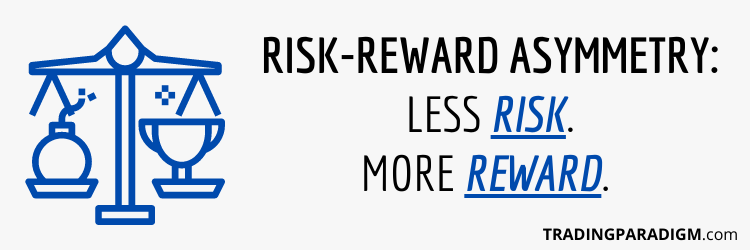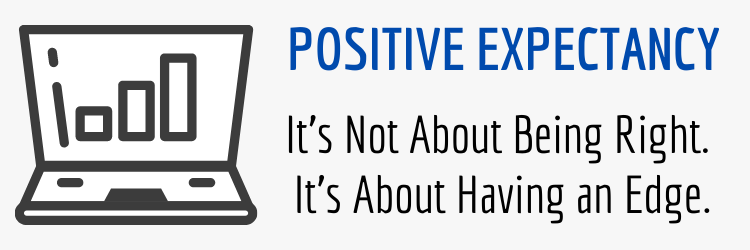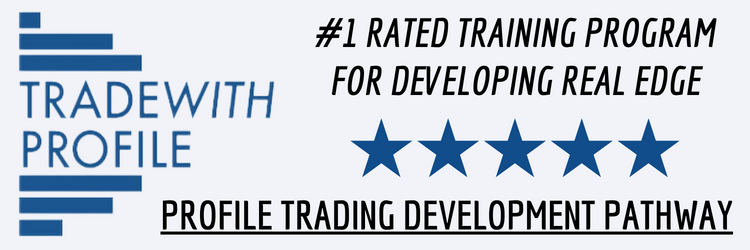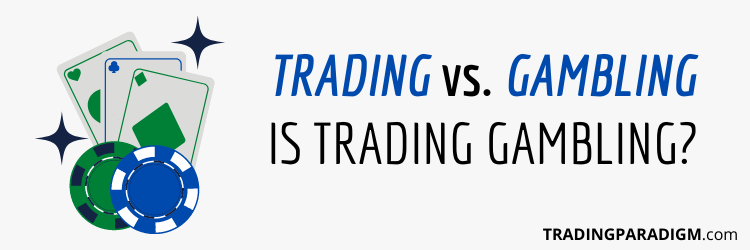What it Means to “Create Your Own Casino” and Thrive as an Active Trader:
One of the best analogies that applies to your edge and overall success as a trader is to create your own personal casino.
What this means is that you need to pinpoint opportunities with positive expected value (where the probabilities and risk-reward work out to produce overall profitability) – and keep taking advantage of the numbers being in your favor over-and-over again.
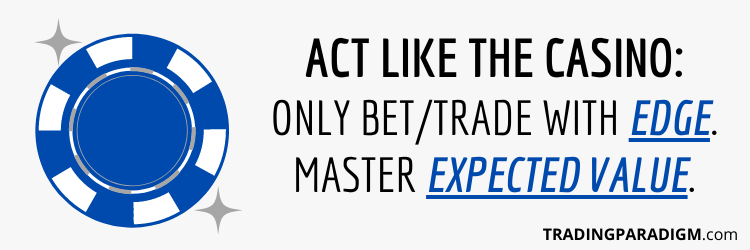
In a casino, they do this with their games. In American-style roulette, for example, a single number bet pays 35 to 1. But there are actually 38 potential numbers that can hit. This difference is the house edge – which allows the casino to win in the long-run.
Of course there will be individual rolls, hours, and maybe even days when the casino loses money from their roulette tables. But over the course of weeks, months, years and thousands upon thousands of rolls – a highly profitable result is virtually guaranteed.
In trading, the “games” are your specific patterns/setups/strategies/systems. And assuming that your systems actually have positive expectancy and that you appropriately manage risk, the end result shouldn’t be in doubt – you’ll be profitable long-term.
So to create the “games” you choose to play, you have to backtest, track trades, analyze them, and figure out the common criteria that “stacks the deck” in your favor. Certain patterns/setups/strategies work much better in specific conditions/contexts.
You Don’t Have to “Play” Unless there’s a “Game” Offering You Favorable Risk-Reward:
The great part about trading is that you can pick your spots for getting involved. Nobody is forcing you to do anything. You can essentially just sit there and “wait for your pitch”. There’s no umpire calling strikes, so there’s no need to chase pitches you don’t like.
In other words, if the probabilities and risk-reward aren’t lining up in your favor, you simply don’t have to play. You just wait for the next opportunity to arise and determine whether or not it’s worth taking a swing at. There’s always another potential trade.
Unfortunately, most market participants don’t have the knowledge, skills, edge, and self-control to consistently act in their own best interest. Most trade impulsively based on hunches, fears, and desires – and then get mad at markets for not fulfilling their wishes.
Society makes trading out to be a “risky” endeavor – and I certainly agree that there are risks involved (as there are with anything in life). But it’s as though most market participants forget/don’t realize that they actually have quite a bit of control over it.
You choose your patterns/setups, position sizes, daily/weekly loss limits, and all the other rules that dictate your strategies/systems and help manage risk. So you can’t blame the market for any of your trading woes – you have to blame your process.
Markets are constantly offering opportunities from a probabilistic perspective. How you react to them determines your success/failure.
Luck Plays No Role in Long-Term, Sustainable Trading Success – Develop Skills and Edge:
It’s certainly possible to go into a casino once or twice and win big out of sheer luck – even though the odds aren’t in your favor. But if you continue going back to play games hundreds or thousands of times without edge, you’ll ultimately end up a net loser.
In the long-run, probabilities work themselves out and luck fades away (the law of large numbers). So over the course of months and years, it’s difficult to defy the odds. You absolutely have to have an edge in order to achieve long-term, sustainable success.
The tricky part is that markets are constantly evolving, causing edges to shift and change over time. This is why being in-tune with the market and having strong technical, analytical, and mental skills are so important. You have to be able to adapt.
Top Training Program For Developing Real Market Edge → PROFILE TRADING DEVELOPMENT PATHWAY
In the trading industry, there’s so much talk about patterns/setups. Most people want to be spoon-fed specific ones – basic, easy-to-follow setups like buying doji candles and selling evening stars, for example. But these surface-level patterns aren’t enough.
What you need to understand is the context and nuance behind those patterns – and that requires legitimate skills. Those who achieve durable trading success have acquired a deep level of market and self-understanding that the masses simply haven’t.
Skills are what allow you to locate and extract edge in any market environment. The dynamic nature of markets requires adaptation.
Conclusion – Be Like the Casino Playing With Edge, Not Like Patrons Playing For Thrills:
Before I started trading, I used to think going to the casino was fun. I would go a handful of times each year with my friends and family – and think that I was some sort of master at roulette, picking numbers based on meaningless patterns and hunches.
But now, as a trader, I can barely get myself to play because I understand that it’s a losing proposition. In fact, I haven’t been to a casino in years. It just doesn’t align with the concepts of having asymmetric risk-reward and positive expected value.
It’s the casino that has the edge – that’s why the saying “the house always wins” exists. The rules and payouts for each game are designed for the casino to win long-term. And “keep the players playing” is their motto in order to leverage the law of large numbers.
What’s funny is that those who know I’m a trader assume I love the casino (because they equate both with gambling). But good gambling/trading and bad gambling/trading are two entirely separate things. Good gamblers only bet when they have an edge.
Due to variance, short-term results can seem chaotic/random. But over a large sample size, probabilities work themselves out. Like I mentioned earlier, there are plenty of hands/rolls/spins where the casino loses, but long-term profitability is never really in doubt.
When you consistently put the odds in your favor and properly manage risk over a large number of trades – the numbers don’t lie.
Learn More in the Trading Success Framework Course
Written by Matt Thomas (@MattThomasTP)
Related Pages:
- Day Trading vs. Gambling – Is Day Trading Gambling?
- What is Asymmetric Risk-Reward in Trading and Investing?
- How to Properly Track Your Trades to Figure Out What Works
- Trading is a Skill – Knowledge Will Only Get You So Far
- What is a Statistical Edge in Trading – Expected Value Explained


